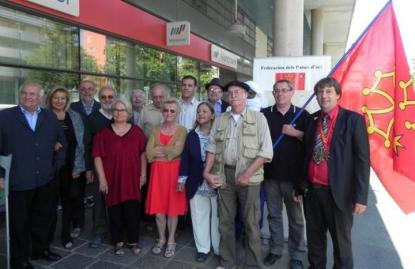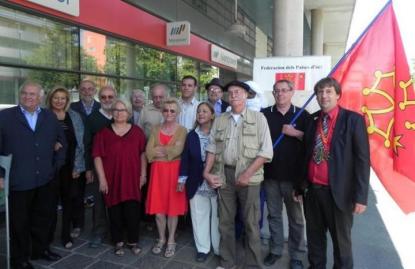Certainly!
Cristou Daurore is a professor of Niçois and a host at Radio Pantaï, a community radio station in Nice that broadcasts in Nissart, Provençal, and Alpine. But alongside this, he is first and foremost the President of the Cri, elected in 2009. This atypical character tells us everything about his fight for the independence of Occitania and sheds light on a subject often overshadowed by misunderstanding.
 It is National Day on this Tuesday, September 11, in Catalonia, and on this occasion, the Catalans, never tiring in their struggle, return in force to the streets of Barcelona to express their demands to Madrid once more. It is therefore essential to assess the situation of the French Occitan separatists who have called for solidarity with their Catalan neighbors.
It is National Day on this Tuesday, September 11, in Catalonia, and on this occasion, the Catalans, never tiring in their struggle, return in force to the streets of Barcelona to express their demands to Madrid once more. It is therefore essential to assess the situation of the French Occitan separatists who have called for solidarity with their Catalan neighbors.
Nice Premium: “What are you expecting from today’s demonstration?”
Cristou Daurore: “We hope that the Catalans will achieve independence. That will show that within Europe, medium-sized states can manage themselves. We expect a snowball effect to raise awareness that, beyond language, managing a small territory simplifies matters economically. Occitania greatly supports Catalonia; we envision a prosperous future, and Catalonia sets an example for us.” We are very attentive to what is happening in Catalonia, in Barcelona, and we will use the same methods to succeed just as they have.
NP: “What are the clear demands of the Occitan Federal Republic?”
Cristou Daurore: “The Occitan Federal Republic is a republic that, for now, is not officially recognized because the territories that represent Occitania are scattered. We count 33 departments in the south of France, 12 valleys in Italy, a small part of Spain, and Monaco. The primary demand is linguistic; Occitan is a co-official language in Spain, a language of the Republic in Italy (but optional), and part of the dialect in Monaco. In France, the only official language is French, and that poses a problem. However, since 1951, we have been allowed to teach Occitan, but we want an official status. France is one of the few countries not to have ratified the Charter of Minority Languages. All this to say that the linguistic aspect is fundamental: if the language dies, there is no reason for the territory to exist. Within the Occitan Federal Republic, we aspire to independence.”
NP: “Do you believe you are mocked by the political parties and bureaucracies in place, or are they rather fearful?”
Cristou Daurore: “We now have five regional councilors elected in the last regional elections, including two in P.A.C.A, and our last demonstration for the Occitan language in Toulouse gathered more than 30,000 people… Given that we are starting to have elected officials (mayors and a European elected official), we are starting to be taken seriously, but we are just beginning. All our demands are peaceful, yet those who employ violence do not hear us, and that is a regret! The two major parties, the UMP and the PS, have always made us all sorts of promises regarding the teaching of historical languages, but we are still waiting.”
NP: “By the way, the subject you advocate for was not addressed during the previous presidential elections; what is the future of the movement?”
Cristou Daurore: “Only two candidates addressed the issue. Eva Joly first tried to speak to the media about this linguistic issue, while François Bayron, who is Occitan himself, wanted to promote the learning of Occitan in schools. What we are waiting for now is for François Hollande to keep his commitments; he has promised to ratify the Charter of Minority Languages. What is interesting is that the current President is linked to EELV (Europe Ecologie Les Verts), which has obtained a parliamentary group that includes an independentist Breton deputy. I therefore think the subject will soon be addressed, and it proves that it is a topic interesting to the French who speak these historical languages.”
NP: “Today your movement seems pacifist, but why does it sound like a separatist movement? Finally, what role do the media play in the evolution of this movement?”
Cristou Daurore: I prefer the term unification since Occitania is split into four states, only one of which is dependent and sovereign: Monaco. So, separated from France, yes, but not from Europe.
We must no longer think in terms of nation-states like France, which tries to standardize all the peoples that constitute it. Sooner or later in history, we have seen that all oppressed peoples have gained their independence. I take the example of Nice, where nothing is done without the authorization of Paris (the Var plain projects). We are not locally in control of our projects. In the past, centralization in Paris was excessive, and it persists today, especially at the national education level. We want a federal Occitania, I insist!
Regarding the media, there are very few that use our language in the Occitan territory. It is very limited and reaches a very small population. We convey the following message to the French media: we do not want to die but to be reborn!


